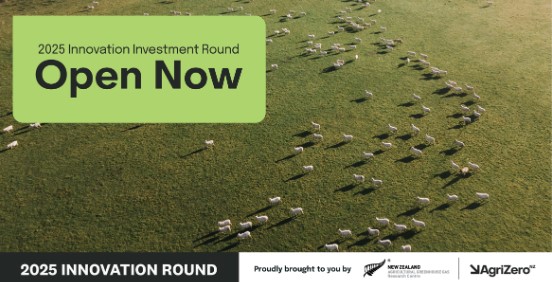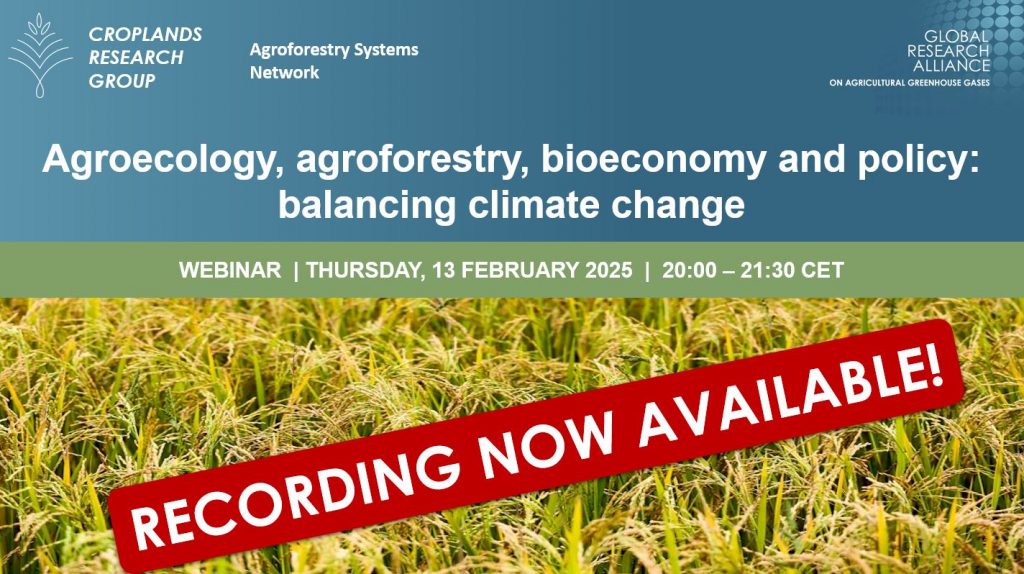The New Zealand Climate Smart Agriculture Initiative (NZCSA) is excited to share some videos highlighting their work.
The NZCSA provides practical support to developing countries in Africa, ASEAN, Latin America and the Caribbean with a strong focus on capability, capacity, and the infrastructure needed to effectively account for agricultural emissions. It is part of New Zealand’s actions in support of the GRA.
The Systems Microbiology & Natural Products Laboratory (www.HessLab.com ) at UC Davis will be hiring several additional postdocs in the next 12 months.
The new hires will work on different aspects of rumen microbiology with emphasis on:
• isolation, cultivation and metabolic engineering of methanogens and acetogens
• hydrogen and carbon flow during anaerobic digestion/fermentation
• rumen fungi
Start dates are negotiable – opening great opportunities for students who are graduating in the next 12 months.
Potential candidates can reach out directly to Dr. Matthias Hess ([email protected] ) or his lab manager Dr. Saumya Wickramasinghe ([email protected] ).
Closing Date: 31 May 2025
Location: Talence, France
In the context of the ANR-funded project H2Rumen (https://lnkd.in/eEJHUf25 ) coordinated by Rafael Muñoz-Tamayo, we are hiring a postdoctoral researcher in the Pleiade team of Inria in Bordeaux, France, to work on an exciting project in systems biology and metabolic modelling.
 A dynamic research environment, benefit from interdisciplinary collaborations, and receive supportive mentoring!
A dynamic research environment, benefit from interdisciplinary collaborations, and receive supportive mentoring!
 Location: Inria centre at the university of Bordeaux (Talence, France)
Location: Inria centre at the university of Bordeaux (Talence, France)
 ️ Start date: Fall 2025 (flexible)
️ Start date: Fall 2025 (flexible)
Duration: 18 months + 14 months in Paris-Saclay
 Candidate profile:
Candidate profile:
– PhD in systems biology, bioinformatics, applied mathematics, or related field
– Strong background in modelling (metabolic networks, ODEs…)
– Proficiency in Python, or equivalent
– Interest in interdisciplinary work and integration of biological data
 Application online https://lnkd.in/enmaaYe6
Application online https://lnkd.in/enmaaYe6
 More info here: https://lnkd.in/ejDrRa-i
More info here: https://lnkd.in/ejDrRa-i
Agriculture & Climate Change: Science into Action is a national conference hosted by The Department of Agriculture, Food and the Marine, at Dublin Castle on Thursday 5th June 2025, with the purpose to address the relationship between agriculture and climate change, focusing particularly on scientific updates and implementation on farms of climate mitigation practice.
For more information click HERE.
In the year that Ireland holds the Chair of the Global Research Alliance for Agricultural Greenhouse Gases, the GRA Council Meeting will be held in Dublin alongside this conference.
The Global Research Alliance (GRA) is very pleased to welcome Pakistan as our 69th Member Country!
Pakistan’s participation in the GRA will be coordinated through the Global Climate-Change Impact Studies Centre. Pakistan is among those countries in the world whose economies are heavily reliant on agriculture, and despite being a low GHG emitter in the world, aspires to contribute to the global efforts to reduce emissions.
Pakistan is taking several important steps to address the issue of greenhouse gas emissions in its agricultural sector. Through a combination of technological innovation, improved farming practices, renewable energy, and policy frameworks, Pakistan aims to reduce its agricultural emissions while enhancing productivity and resilience to climate change. However, further efforts and investments are required to scale up these initiatives and overcome existing challenges.
We look forward to working together to grow more food without growing more greenhouse gases.
For more information on the GRA or how to become a member country please contact the GRA Secretariat.
The Innovation Investment Round is proudly brought to you by the New Zealand Agricultural Greenhouse Gas Research Centre and AgriZeroNZ

This is a competitive funding opportunity, dedicated to developing or accelerating research, tools and technologies for the mitigation of agricultural GHG’s in NZ.
After successfully funding multiple projects over the past 5 years, it is back for 2025, with increased funding!
FOCUS FOR 2025
Applications are invited for projects that address:
- Reducing nitrous oxide emissions from ruminant animal deposited urine
- reducing methane emissions from enteric fermentation in grazing ruminants
KEY FEATURES
- Total funding up to NZD$4 million
- Up to NZD$1 million per project
- Project duration maximum 2 years
- Collaborations & co-funding strongly encouraged
- New Zealand and international applications welcome
This is an exciting opportunity to drive change and shape the future of mitigation tools and tech for farming in New Zealand. If you’re working on cutting-edge solutions, we want to see your submissions!
Closing Date: 3 April 2025
Location: Rome, Italy
The Food and Agriculture Organization of the United Nations (FAO) contributes to the achievement of the 2030 Agenda through the FAO Strategic Framework by supporting the transformation to MORE efficient, inclusive, resilient and sustainable agrifood systems, for better production, better nutrition, a better environment, and a better life, leaving no one behind.
FAO’s commitment to environmental sustainability is integral to our strategic objectives and operations.
The Animal Production and Health Division (NSA) promotes and facilitates the sustainable development of the livestock sector, optimizing its contribution to nutrition, food security and rural poverty reduction. NSA integrates scientific, technical expertise and policy advice, it facilitates policy dialogue (including through intergovernmental bodies), encourages good governance, manages knowledge and provides information, analysis and technical assistance for the development and implementation of innovative solutions to produce safe animal products more sustainably, efficiently, and in a more integrated manner.
The post is located in the Sustainable Animal Production, Feed and Genetics Branch (NSAP) of the Animal Production and Health Division (NSA) at FAO headquarters in Rome, Italy.
The activities of the Branch cover all production systems, from pastoralism to intensive systems, including crop-livestock integrated systems, and aims to enhance their sustainability in its three pillars: environmental, economic and social.
Attached you can find the vacancy announcement.
To apply, visit the recruitment website at Jobs at FAO
Check out the IRN’s latest newsletter looking back on the activities achieved in the last half of 2024 and introducing their network’s two new co-chairs from New Zealand and Samoa!
Read it HERE.
Hosted by New Zealand and co-sponsored by Australia, the United States, Canada, and Peru. This workshop series focused on gathering young emerging leaders working in their communities to share their experiences and explore indigenous-led measures to reduce the impact of climate change on food systems and food security.
The first workshop was online in November 2023 and the second workshop was in-person on 14 August 2024 in Trujillo, Peru. The workshop series report exploring the outcomes of this project is now available HERE.
For more information contact the Project Overseer, Shiloh Babbington at [email protected]
The Feed Additives Flagship Project, led by the Feed and Nutrition Network (FNN) of the Global Research Alliance on Agricultural Greenhouse Gases and funded by the Global Dairy Platform, has released a groundbreaking collection of Technical Guidelines. The project aims to accelerate the development and implementation of methane-reducing feed additives to significantly reduce greenhouse gases emissions from ruminants. The Technical Guidelines will help scientists and industry leaders develop effective feed additives to mitigate enteric methane emissions.

The “Technical guidelines to develop and implement methane-reducing feed additives for ruminants” webinar recording is available HERE!
The Qinisa Initiative at Future Africa hosted a high-profile delegation on 17 January 2025, including the Vice-Chancellor of the University of Pretoria, Prof. Francis Petersen, and New Zealand High Commissioner to South Africa, H.E. Philip Richard Hewitt. The Initiative fosters regional collaboration in agricultural greenhouse gas (GHG) mitigation by enhancing research, innovation, and information-sharing across Southern Africa.
During the visit, delegates toured the Qinisa measurement hub, a flagship project supported by the Global Research Alliance on Agricultural Greenhouse Gases (GRA). The hub provides advanced GHG measurement capabilities, complementing external facilities like the International Livestock Research Institute (ILRI) in Nairobi. High Commissioner Hewitt praised the initiative as a milestone in climate change mitigation and reaffirmed New Zealand’s commitment to capacity-building in the region.
Prof. Petersen acknowledged the contributions of key stakeholders, including the GRA, the New Zealand government, and leading researchers, in equipping the University of Pretoria with state-of-the-art GHG measurement tools. He emphasized the importance of interdisciplinary collaboration and scientifically grounded solutions to ensure sustainable outcomes.
Experts at the event, including Prof. Wanda Markotter, Dr Linde du Toit, and Dr Ackim Mwape, highlighted the role of Qinisa in integrating data, coordinating related programs, and supporting governments in tracking Nationally Determined Contributions (NDC) targets. Prof. Frans Swanepoel stressed the need for prioritizing livestock-related GHG mitigation, given its significant contribution to emissions and its importance to rural livelihoods.
The visit served as a strong endorsement of the Qinisa Initiative’s mission to strengthen partnerships, build regional research capacity, and develop targeted interventions for reducing agriculture’s carbon footprint while improving livelihoods.
Croplands Research Group webinar recording available HERE!
This webinar provides the main definition of agroecology and agroforestry at the global level and the current extent of agroecology and agroforestry at EU and global levels. The connection of sustainable farming systems such as agroforestry and the link to climate change and bioeconomy are highlighted.

